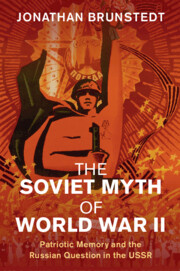Book contents
- The Soviet Myth of World War II
- Studies in the Social and Cultural History of Modern Warfare
- The Soviet Myth of World War II
- Copyright page
- Dedication
- Contents
- Figures
- Acknowledgments
- Abbreviations
- Additional material
- Introduction
- 1 Stalin’s Toast
- 2 Victory Days
- 3 Usable Pasts
- 4 Monumental Memory
- 5 Patriotic Wars
- Conclusion
- Bibliography
- Index
5 - Patriotic Wars
Late-Soviet War Memory and the Politics of Russian Nationalism
Published online by Cambridge University Press: 24 June 2021
- The Soviet Myth of World War II
- Studies in the Social and Cultural History of Modern Warfare
- The Soviet Myth of World War II
- Copyright page
- Dedication
- Contents
- Figures
- Acknowledgments
- Abbreviations
- Additional material
- Introduction
- 1 Stalin’s Toast
- 2 Victory Days
- 3 Usable Pasts
- 4 Monumental Memory
- 5 Patriotic Wars
- Conclusion
- Bibliography
- Index
Summary
This chapter explores the relationship between Russian nationalism and official war memory during the zenith of nationalist participation in Soviet politics (1968–1980s). It focuses on some of the most explicit nationalist writings and the involvement of nationalist enthusiasts in late-socialist memory politics to determine the war’s place in the pro-regime nationalist imagination. As the chapter argues, Russian nationalists reveled in prerevolutionary Russian themes but largely abstained from claiming the war as an unambiguously Russian achievement. That is to say that at the peak of official support for Russian nationalist expression and activism, the Russocentric paradigm did not extend to official representations of victory, even among this paradigm’s most ardent supporters. In an era defined by the growth of Russian national self-expression, the victory myth retained its role as social leveler and instrument of pan-Soviet identity and mobilization. At the same time, however, several prominent nationalist writers and activists found ways to navigate the Soviet people doctrine by exploiting areas of ambiguity and overlap with the war’s official memory. By the end of the 1970s, among nationalist intellectuals and their supporters, this patriotic parallelism had begun to redefine the nature of victory in subtle but not insignificant ways.
- Type
- Chapter
- Information
- The Soviet Myth of World War IIPatriotic Memory and the Russian Question in the USSR, pp. 214 - 256Publisher: Cambridge University PressPrint publication year: 2021

